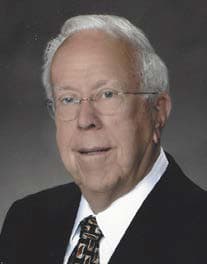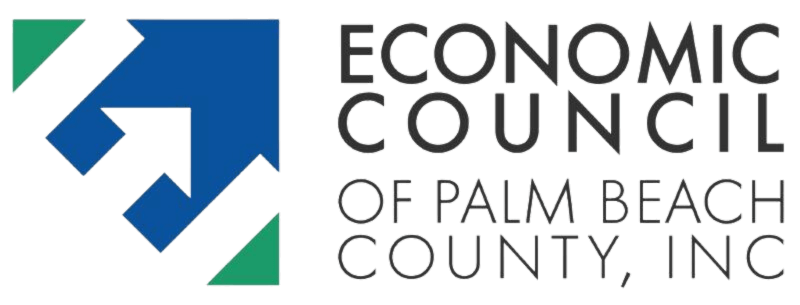LESSONS FROM A LEGACY

LESSONS FROM A LEGACY
Conversations with the Council featuring George Elmore, Founder of Hardrives, Inc.

You would think it would be easy to schedule an interview with a 93-year-old, but George Elmore's not your typical nonagenarian. He keeps a very active schedule and is in more demand than ever between board meetings, events, and work. Yes, he still goes to the office each day.
An original member of the Economic Council of Palm Beach County, George shared how he, along with Alexander Dreyfoos, Llwyd Ecclestone, Bill Dwyer, and others, came together to create the organization. "Back in the 1970s, when we started this, the government was too controlling. The county commissioners were more or less governed by busloads of people, and there were no districts, so we needed to solve problems that businesses had in the community and work together. We knew we wanted a cross-section of businesses, not just contractors."
These "founding fathers" laid the groundwork for many of the organizations we know today, such as The Business Development Board, The Education Foundation, The Cultural Council, The Criminal Justice Coalition, and Sunfest, to name a few. "We would see the need for something and create it."
Born during prohibition, George grew up outside New Castle, Pennsylvania. "We were a working-class family. My father had to quit school in 8th grade because his father had died, and he needed to take care of his family. He eventually met my mother, they got married, and her parents gave them an acre of land on their farm, and that's where I grew up."
The Elmores lived off the land, saving every cent as the country's economy was crippled during the Great Depression. "Rather than spend a nickel for the trolly that went into town, my father would walk three miles each way. But we had everything you'd ever want to eat in our garden.
Mom would can all the apples, peaches, pears, and vegetables that grew in the summer. They'd be stored in the basement, and in the winter, we'd live off that along with the numerous vegetables and our livestock." Everyone, including George, had to pitch in. "I had to wake up every morning at 5 am to swab down that damn barn before they started the milking machines for the cows" Then he'd set off on his daily two-mile walk to school. "Education started me in my life. I was a lousy student, but my mother being a teacher, helped me until I finally found a teacher in math that inspired me. I've always been a numbers guy all my life. I used to have to do it in my head, and now I have a calculator in my damn phone," he said with a chuckle.
After high school, George moved to Fort Lauderdale to join his brother's paving business. Then in 1950, he was drafted for the Korean War, where he served stateside for two years before settling down in Delray Beach in a house next to the Sail Inn, which is still there today. "I decided I wanted to start my own paving business, sold my car, and borrowed $1,500 from my Dad." He knew it would take hard work, but that was a lesson his dad instilled in him at a young age, making him mow lawns to buy his first bike.
Hardrives, Inc was awarded its first contract for $125, and they kept coming. George built the company around his personal values of honesty, loyalty, and personal attention. A key to his success has been evaluating each job from the customer's point of view. "A job isn't complete until everyone is satisfied," he shared, but there were some close calls. "President Lyndon Johnson was coming for the Florida Atlantic University ribbon cutting. It was raining nearly every day, and there were concerns my crews would not finish the road that connected the Turnpike to the Boca Raton campus, but we got it done two days before he showed up."
His high multi-million dollar company literally paved the way in our county, constructing I-95 and many of the roads we travel today. "I've left a lot of tracks in this county." But before the pandemic, he knew it was time for a change. "Before Covid-19 started, I decided I needed to get out. I was in my 90s, and the construction business is not what it used to be. It's changed. I found a place for all my people to go, and I'm in the process of liquidating it out. I hope to have it done by the end of 2023. Then I'm going to sell off my property, so my estate doesn't have to get into a fight about anything."
Over his 70 years in the construction business, he's seen a lot of change, especially in technology. "I remember the early days when our surveyors would get lost because there was no GPS. Now with GPS, they can get right where they need to go, and bulldozers have changed too. Now they're equipped with satellites, and all the operator has to do is move forward and backward. The biggest technological change I've seen in my life is that computers are available for everyone. I mean, look what they've grown into. I can back up my car and look at a camera showing me all the people standing behind me." A far cry from foam rubber and sunglasses, the big inventions of 1929, the year George was born.
Reflecting on his time on the council, he is proud of the group's ability to address critical policy issues. "We see a need, and we get behind it. We saw a need for affordable housing and got behind that. That is what we do. We work with the county to find a solution. Transportation is a challenge we will face, but from seeing the proposed plans, it's amazing even for an old fart like me. I mean automated cars taking kids to school and no one driving anymore."
What drives him and always has is philanthropy. "When I was a kid, I wondered why my dad would put money in the plate at church, but it taught me the importance of giving back. I am concerned that all these people moving here may not get involved in our community. You've got to have people work and be involved. Some are involved. Others are just looking to put coins in their own bank."
Over his life, George has given generously to numerous non-profits, from PBS to the Boy Scouts, the Kravis Center, The Palm Beach County Food Bank, and many more. "The free enterprise system is the greatest system in the world. You create what you want to be. But I worked 24/7, and I learned early on that you have to give back, and it does have rewards. You just don't recognize them until they happen."
One of those rewards was his dedicated wife, Wilma. "We got married when she was 20. I remember I had to ask her mother's permission. During the Korean War, she moved around with me, living in all the guest houses at the bases. She was my help mate and partner for 61 years of adventures." Wilma's health began to decline, and she passed in 2011.
They had two children together, who gave them three grandchildren and six great-grandsons. "I feel lucky, but they have their own lives. I don't meddle in them."
When asked about his key to success, he's happy to share, which he often does with many business leaders. "I tell them to find their niche, make sure your job isn't work, and be happy with what you do."
His personal happiness comes from spending time with Marti La Tour. He remembers chatting with her at an Economic Council meeting, and they've been together for more than ten years now. "I met Marti, and we fell in love. She's, my lady." They keep very busy. They attend events two or three nights a week and stay involved in the numerous issues shaping the county's future. And they plan to do so for a long time to come. "My father lived to ninety-five, and my mother lived to one hundred two. It dumbfounds me where I am. I never would have dreamed that I'd be able to retire and not worry about nothing."
